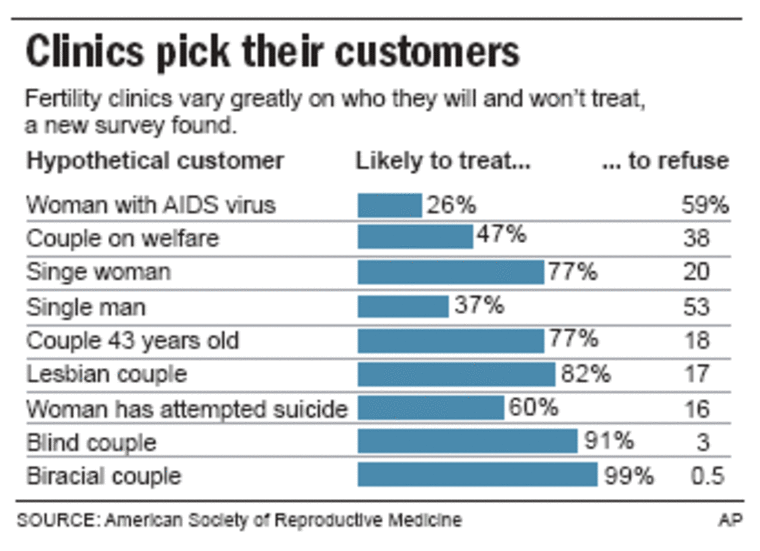They’ll check her ovaries and her bank account, but few U.S. fertility clinics have policies for determining a woman’s emotional or mental fitness to have a child, let alone whether it’s OK to help one who is past menopause, a new survey reveals.
It shines a fresh spotlight on the ethics of the largely unregulated field of reproductive medicine, which reportedly has just helped a 66-year-old woman in Romania give birth.
Answering hypothetical questions, most American clinics said they’d help a 43-year-old get pregnant. One in five would refuse single women, but 5 percent don’t even ask about marital status. One in four would help a woman who has the AIDS virus.
“A gay couple and a couple on welfare were about equally likely to be turned away,” said Andrea Gurmankin, a Harvard School of Public Health psychologist who led the study when she previously worked at the University of Pennsylvania.
Results were published today in Fertility and Sterility, a journal of the American Society for Reproductive Medicine.
“They were all over the place with respect to their views and values,” said University of Pennsylvania bioethics chairman Arthur Caplan, who also worked on the survey.

States need to set guidelines on some big issues, like helping women have babies after menopause, similar to agencies that limit adoptions to people under 55, he believes.
Reproductive decisions now “are too driven by the desires of couples and not enough by the interests of children,” Caplan said.
One in 10 American couples is infertile, and their ability to get medical help to have children depends on a host of subjective criteria and attitudes about parenthood by fertility clinic operators, researchers found.
About 100,000 pregnancy attempts are made each year using in vitro fertilization, in which eggs and sperm are mixed in a lab dish and the resulting embryos are implanted in the womb. More than 177,000 babies have been born this way in the United States.
Small percentage turned away
Researchers sent surveys to directors of 369 clinics or doctors’ offices offering these services around the country; 210 responded.
On average, they turn away only 4 percent of potential customers each year. Only 28 percent had formal policies on who they’d accept or deny.
A whopping 80 percent had customers meet with financial coordinators but only 18 percent had them see a social worker or psychologist.
Asked if they believed that everyone has a right to have a child, 59 percent said yes. Two-thirds believe they have a responsibility to consider a parent’s fitness before helping them conceive.
Medical conditions evoked different responses. Only 1 percent said they wouldn’t help Jehovah’s witnesses conceive, presumably because they refuse blood transfusions that might be necessary for the mother or child.
“Three percent said they were unwilling to deal with a blind couple. We thought that was fascinating,” Caplan said.
However, only 59 percent flat out refused to treat a woman with HIV, the virus that causes AIDS.
“I don’t think the customers, or patients, understand how variable the values are,” Caplan said. One clinic might refuse you, but “just down the road is another place that might take you.”
'Oldest mum' criticized
Although the survey didn’t specifically ask about helping very old women have babies, several experts interviewed by The Associated Press condemned the news about the 66-year-old woman in Romania, who reportedly gave birth to a child created through in vitro fertilization.
Caplan called it “completely unethical and immoral,” noting that average life expectancy for Romanian women is 73 years. The fact she is single makes it worse because it raises the odds the child would have no one to care for her if the mother dies, he said.
Dr. Zev Rosenwaks, director of Weill Cornell University and New York Presbyterian’s fertility services, said his center would not help a 66-year-old but has helped a woman in her early 50s have a child.
His clinic — one of the largest in the nation with nine doctors — requires all egg donors and recipients to see one of the three staff psychologists.
“One should look at each case individually. Medicine does not fit a mold,” he said. “Some 50-year-olds may be in better health than a 42-year-old,” and some single women may have large families willing to help her raise a child, he said.
The reproductive medicine society’s policy says that the mother’s age alone doesn’t make fertility treatment unethical.
“Postmenopausal pregnancy should be discouraged,” but doctors “must carefully consider the specifics of each case,” it says.